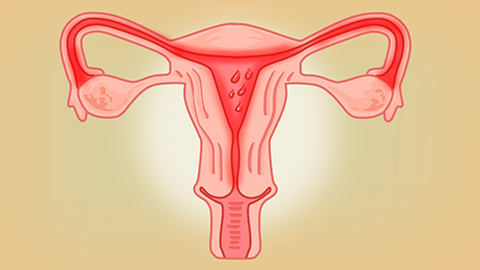Why does the uterus develop polyps?
Generally, the occurrence of uterine polyps may be caused by factors such as hormonal imbalances, long-term mental stress, endometritis, polycystic ovary syndrome (PCOS), and simple endometrial hyperplasia. It is recommended to seek timely medical consultation to identify the underlying cause and receive appropriate treatment under a doctor's guidance. Detailed explanations are as follows:

1. Hormonal Imbalance: Excessively high estrogen levels or insufficient progesterone in the body can continuously stimulate abnormal endometrial proliferation, gradually forming polyps, commonly seen in women of childbearing age. Maintain regular sleep patterns, avoid staying up late, reduce intake of estrogen-containing foods such as royal jelly and bee propolis, keep the diet light, and adjust hormone levels under a doctor's guidance when necessary.
2. Long-Term Mental Stress: Prolonged anxiety and tension can lead to imbalances in the endocrine system, affecting normal hormone secretion and indirectly promoting endometrial proliferation and polyp formation, possibly accompanied by menstrual cycle disorders. Alleviate stress through brisk walking, yoga, meditation, etc., and maintain 3-4 exercise sessions per week, each lasting about 30 minutes, to keep emotions stable.
3. Endometritis: Infection of the endometrium by pathogens such as bacteria or chlamydia causes inflammation, which repeatedly stimulates the endometrial tissue, leading to localized proliferation and polyp formation. Symptoms may include increased vaginal discharge and dull lower abdominal pain. Patients may follow medical advice to use medications such as cefuroxime axetil tablets, metronidazole tablets, and doxycycline hydrochloride tablets to control infection, reduce inflammation, and lower the risk of polyps.
4. Polycystic Ovary Syndrome: Ovarian dysfunction leading to excessive androgen secretion interferes with normal estrogen metabolism, leaving the endometrium chronically exposed to unopposed estrogen stimulation, which makes it prone to develop polyps, often accompanied by oligomenorrhea and hirsutism. Patients should follow medical advice to use medications such as ethinyl estradiol cyproterone tablets, drospirenone ethinyl estradiol tablets, and metformin tablets to regulate hormone levels, improve ovarian function, and reduce the likelihood of developing polyps.
5. Simple Endometrial Hyperplasia: Long-term estrogen stimulation without progesterone antagonism causes excessive proliferation of endometrial glands, with polyps forming in certain areas, often accompanied by heavy menstrual bleeding and prolonged menstruation. Patients may follow medical advice to use medications such as progesterone soft capsules, dydrogesterone tablets, and medroxyprogesterone acetate tablets to inhibit endometrial hyperplasia.
In daily life, maintain good vulvar hygiene by washing with warm water daily, changing cotton underwear regularly, avoiding unhygienic sexual practices, and reducing the risk of intrauterine infection. Regular gynecological ultrasound examinations should be conducted to monitor endometrial status, enabling early detection and timely intervention to maintain uterine health.





